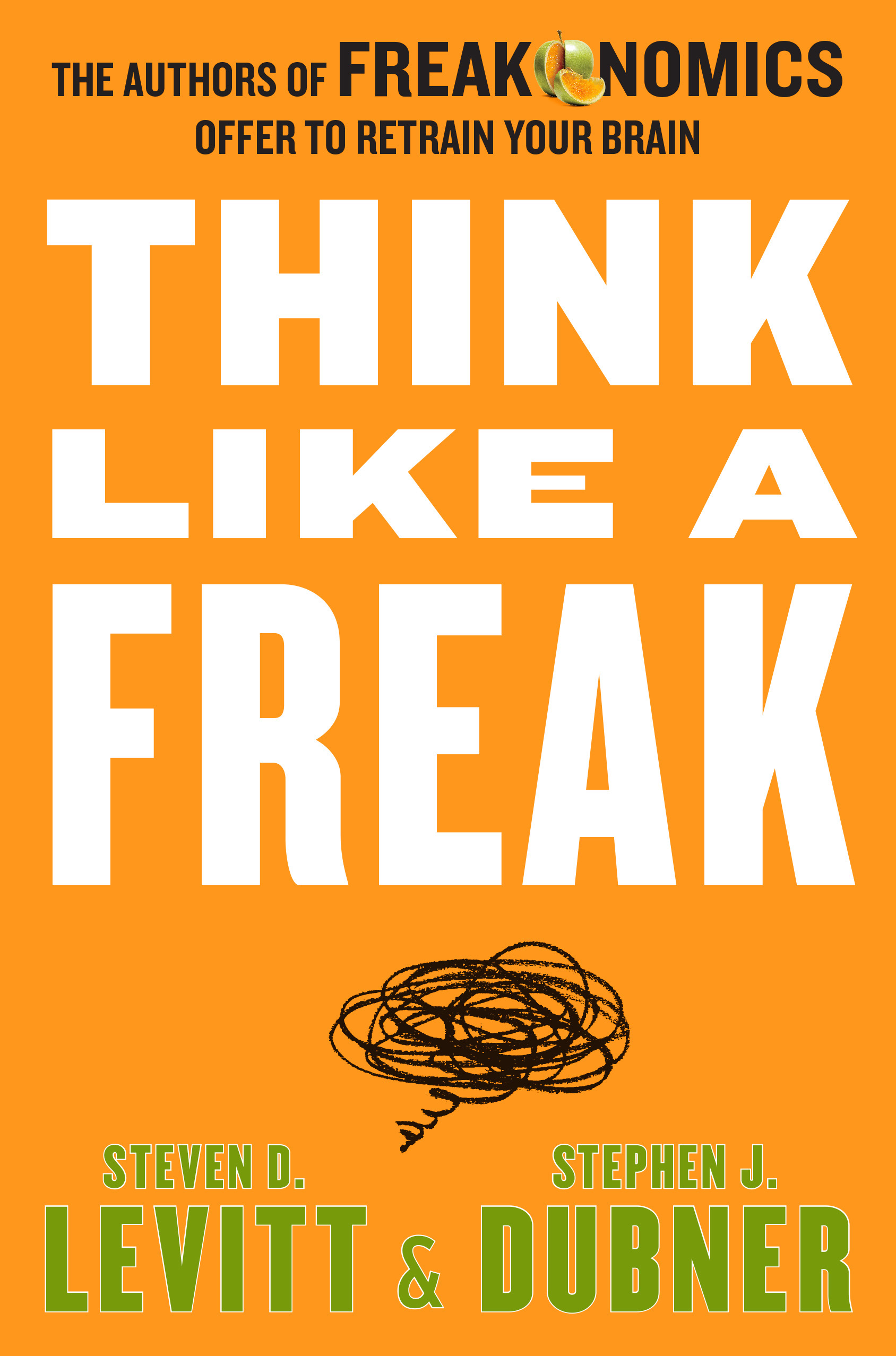Steven Levitt and Stephen Dubner (courtesy of Freakonomics Facebook page)
Conventional wisdom can be a bitch. While there may be occasional wisdom in crowds, the truth is that fools seldom differ.
If going with the flow could land us in hot soup, how then should we solve the many problems in our world?
Enter Think Like a Freak by renowned economist Steven D Levitt and award winning journalist Stephen J Dubner.
Authors of the well loved Freakonomics and Super Freakonomics (both which I highly recommend as a behavioural economics nerd!), these gentlemen’s latest offering brings us on a delightful journey through the worlds of economic analysis, psychology, criminology, sociology and medicine.
Distilling unconventional wisdom through whimsical storytelling, Think Like a Freak hypothesizes that the economic approach is superior to relying on one’s hunch, tradition, or ideology.
Using data, their numbers-based approach examined at how incentives succeed (or fail), how resources are allocated, and how obstacles can be overcome.
From minor life hacks to major global reform, the book distilled eight interesting lessons for us.
#1 Faking It Won’t Make It
Do you know what the three hardest words in the English language is? Well, they are “I don’t know”
Why are we so afraid to revealing our ignorance?
Well, according to the authors, our in-built moral compass compels us to think that we know more than we do. This occurs even when we are ignorant of the full facts of the case.
To overcome this, we should conduct field experiments and rely on empirical evidence (ie cold hard facts) to inform our decisions.
A case in point was the Iraq War.
Conducted based on US claims that Saddam Hussein had weapons of mass destruction, it lasted 8 years and costs US$800 billion and nearly 4,500 American deaths, along with over 100,000 Iraqi fatalities. According to some studies, incidents of terrorism have not declined after the Iraq War – on the contrary it has quadrupled after the war!
#2 Redefine Problems and Ignore Limits
Courtesy of Spokeo
Slim and slight in build, 23 year old Takeru Kobayashi (aka Kobi) was mocked by an opponent to have “legs that are thinner than his arms”. However, he still went on to win the international Hot Dog Eating Contest in 2001, wolfing down an amazing 50 hot dogs and buns in 12 minutes.
This was a doubling of the previous record of 25⅛ hot dogs and buns!
How did Kobi achieve this feat?
Instead of asking “How do I eat more hot dogs?”, Kobi asked a different question: “How do I make hot dogs easier to eat?” Beyond redefining the problem, he also tricked his brain into ignoring the artificial limits placed on the hot-dog records.
Similarly, we should ask the right questions and shut out our artificial limits when solving any problem. I guess this was how Steve Jobs managed to achieve superlative performance from his team, using his infamous reality distortion field.
#3 Understand the Root Cause
Gravitating towards obvious and proximate causes could lead to wrong solutions.
The only way to resolve this? Dig deeper into the root causes.
An example of this problem is global starvation.
Quoting economist Amartya Sen, the book cited that “Starvation is the characteristic of some people not having enough food to eat. It is not the characteristic of there being not enough food to eat.”
In countries where political and economic institutions support the corrupt few, food is routinely withheld from the hungry masses.
Similarly, by looking through longer and more powerful lenses, young Australian doctor Barry Marshall discovered that the cause of gastro-intestinal ulcers wasn’t psychological stress or spicy food. While these are aggravating factors, the root problem came from the bacteria Helicobacter pylori.
To confirm his suspicions, Marshall ingested the bacteria himself and validated his results through empirical evidence.
#4 Embrace Your Inner Child
By thinking like a kid, we can ask small questions and tackle big problems a chunk at a time. We should also give serious thought to obvious answers, avoid dogma, be genuinely curious, and avoid over thinking issues.
This approach paid off in Gansu, China.
Traditionally, poor academic performance of kids there were attributed to poverty or lousy teachers. However, the eureka moment came hen economists Paul Glewwe, Albert Park and Meng Zhao discovered that a whopping 60% of the “problem learners” there had poor vision.
Out of 2,500 kids who needed glasses, only 59 wore them. When half of these students were given spectacles, their grades improved 25% to 50% more than their uncorrected peers!
#5 Offer the Right Incentives
In a charming story narrated by the authors, we learned how ad salesman Brian Mullaney successfully deployed a “once-and-done” donation strategy, resulting in his charity Smile Train being able to provide more than 1 million cleft lip surgeries in nearly 90 countries.
His secret? Tell potential donors the following: “If you make one gift now, we’ll never ask for another donation again.”
By doing so, donors were “incentivised” to make bigger gifts so that they would not be harassed in the future!
Designing the right incentives can indeed trigger the right responses. Here, the authors suggested these rules:
- Figure out what people truly care about, not what they say they care about;
- Incentivise on the dimensions valuable to them but cheap to provide;
- Pay attention to their responses;
- Switch the frame from adversarial to co-operative;
- Don’t assume that people will do something because it is the “right” thing to do; and
- Know that some people will always game the system. Applaud their ingenuity rather than curse their greed!
#6 Teach Your Garden to Weed Itself
Known in economic speak as a separating equilibrium, the trick here is to create incentives that help a guilty party to unwittingly reveal his guilt through his own behaviour.
This principle was elegantly regaled through the story of 13th century Hungarian judges. Apparently, these judicial members employed a seemingly barbaric “trial-by-ordeal” to discern the innocent from the guilty.
Back then in the Middle Ages, if a court couldn’t satisfactorily determine if a defendant was guilty, it would turn the case over to a Catholic priest. The priest would then administer an “ordeal” that involved boiling water or a smoking-hot iron bar on both parties. It was believed that the innocent would be miraculously delivered from harm.
Out of 308 cases that entered a trial-by-ordeal phase, 100 were aborted before a final result. Surprisingly, amongst the remaining 208 people, only 78 were badly burned.
So what happened here?
Based on the beliefs in those days, it was likely that a guilty person would confess his guilt when faced with such an ordeal. If he chose not to do so, he would not only be imprisoned or fined but possibly spend his life in pain.
Similarly, an innocent party would undergo the ordeal as he would have believed that God would not allow the fiery curse to harm him. This created a “separating equilibrium” where only innocent defendants were willing to undergo ordeals.
#7 Learn the Art of Persuasion
Do you know what’s the best way to persuade someone who doesn’t want to be persuaded? Yes, tell them a story.
The power of storytelling is demonstrated by how much easier it was for us to remember stories from the Bible than in recounting all 10 of the Ten Commandments.
Beyond this, the authors also shared the following advice on persuading others:
- Understand how hard persuasion is going to be – and why. Often, your opponent’s opinion is likely to be based less on fact and logic and more on ideology and herd thinking.
- Shifting the focus away from yourself towards the other party, ie “It’s not me; it’s you”
- Do not pretend that your argument is perfect. On the contrary, admitting the mistakes and flaws of your approach makes it more believable.
- Acknowledge the strength of your opponent’s argument.
- Keep insults to yourself. Yes, name-calling will not get you anywhere!
#8 Quit to Win
Last, but certainly not least, the authors suggested that one could do a “premortem” to decide all the worse case scenarios before undertaking any endeavour. By doing so, one could consider letting go of something and quitting rather than just ploughing on.
Quoting from psychologist Carsten Wrosch, the authors found that people who quit their unattainable goals saw physical and psychological benefits.
Folks who do so escape from the fallacy of sunk costs (“throwing good money after the bad”) and can reduce their opportunity costs (ie “what could I have done with that money and time?”).
A Great Way to Retain Your Brain
Insightful yet entertaining, Think Like a Freak showcased what Levitt and Dubner does best – challenge the status quo and upend group think.
As one who thinks critically and reflectively, I love their fact-based empirical approach to solving problems. I also found the chapter on persuasion especially useful, given that “thinking like a freak” may get you into trouble with the ubiquitous “moral police” who dominates our society these days.
What are your thoughts on the eight strategies above? Have you tried to “think like a freak” at work or in your daily life?



